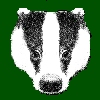The Case Against Snares (i.e. the Badgerland view)
| Badger Encounters in the Wild book |
![Badger Encounters in the Wild Jim Crumley [Book]](../../images/badger_encounters_in_the_wild.jpg) |
Superb
book of Jim Crumley's encounters with badgers in the wild in Scotland. The quality of the writing is superb.
A great read. Click here to buy:
Encounters in the wild
|
http://www.thisisthenortheast.co.uk/the_north_east/
eco/pages/feb01/snares.html
The Animal Rights Activist
Staunch opponent : Animal rights
activist John Gill
John Gill, 51, of Castleside, near Consett, County Durham, has been
prosecuted several times - and served time in jail - for a campaign which
he began in 1991 when his dog died after being snared. He dedicates
himself to removing snares, even if it means trespassing on private land.
There is indisputable and overwhelming evidence that all snares cause
horrific injuries to animals. Sheep, deer, cats, dogs, badgers, otters and
hares as well as foxes die in snares.
There is a book called Fair Game, which is written by two police
wildlife liaison officers, that claims to be a concise and comprehensive
guide to the law relating to country sports and the conservation and
protection of wildlife.
It states that extreme care must be taken to ensure that Schedule 6
animals (such as otters and badgers) of the Wildlife and Countryside Act
1981 cannot come into contact with snares. It also says that snares should
never be set in, or attached, to fences.
The present day badger population is estimated to be twice that of the
fox population. Otters are on the increase. The reality is that snares are
set in large numbers on tracks in woodland which any animal will use. Dead
animals such as deer, sheep, hens, rabbits, seagulls and pheasants are put
in piles to attract scavengers and surrounded by snares.
In many woods, obstructions are built using fencing and branches to
create an obstacle wall directing ALL animals that come along to a gap
where a snare is placed.
The setting of snares in or under, and attached to, fences and under
gates is a common practice. I have a police statement taken from one
gamekeeper which says that in one location alone over 90 snares were set
in holes under a fence line.
In 1968, a trial was run comparing the efficiency and cruelty of the
free-running (legal) and self-locking (now illegal) snares. Neither type
of snare was significantly more efficient nor less cruel than the other.
Badgers die with their throats cut open, jaws ripped off, stomachs cut
open and even scalped by snares.
At my jury trial in 1999 the judge ruled that images of snared animals
were too emotive for the jury to see.
The RSPCA
The RSPCA has long campaigned for the
abolition of snares. A statement from the organisation said:
The RSPCA contends that while some rural predator control may be
required, snares are indiscriminate and cruel and should be banned.
The RSPCA is opposed to all types of trap or snare that cause suffering
and injury to animals. Self-locking snares or those that are set in places
likely to cause injury to protected wild animals are illegal by virtue of
the Wildlife and Countryside Act (1981).
Legal free-running snares set for wild animals have to be inspected
once a day. Snares can be legitimately set for animals such as foxes, but
they are indiscriminate.
Inspectors frequently find both domestic and protected wild animals
caught in snares. Many have been trapped for hours and are suffering
severe physical injury and are terrified.
The basic snare is a wire that is designed to close around the animal's
neck, although very often it can catch an animal around the abdomen.
Sometimes the victims are protected species such as badgers and deer.
Inspectors have come across badgers that have broken the snare and
dragged it with them, and have sustained deep wounds as the wire continues
to cut into their flesh.
We accept that the killing of some animals is necessary but snares are
not the answer. The society has long called for the end to hunting with
dogs, and advocates control where necessary using a trained marksman with
a high-powered rifle.
Snares, gassing and poisoning can lead to extensive suffering and are
not a humane way of killing so called pest species.
There are two solutions to the problem. Firstly an outright ban, the
second option would be an enforced code.
The RSPCA would seek tighter regulation on the use of snares, perhaps
by an amendment to the Wildlife and Countryside Act making the already
existing voluntary gamekeepers' codes mandatory.
|
"The world of badgers is in some ways analogous with the
human world. Like us, their behaviour is greatly influenced by their need for
homes and living space, and being social like we are, they too have their
problems of learning how to live together ..... and with us" |
|
Ernest Neal
|
|

![Badger Encounters in the Wild Jim Crumley [Book]](../../images/badger_encounters_in_the_wild.jpg)